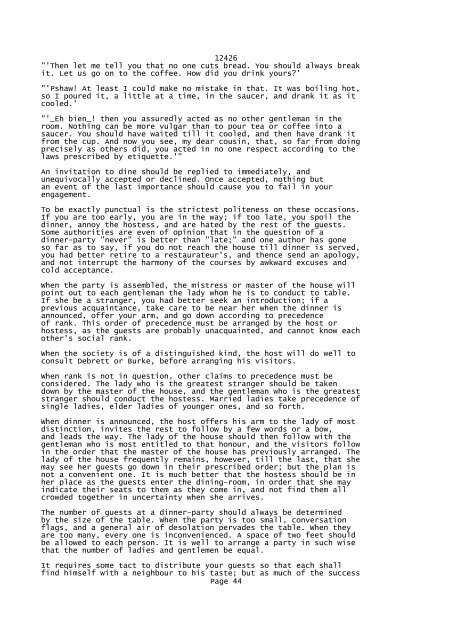12426 - Notepad - University of Macau Library
12426 - Notepad - University of Macau Library
12426 - Notepad - University of Macau Library
Create successful ePaper yourself
Turn your PDF publications into a flip-book with our unique Google optimized e-Paper software.
<strong>12426</strong><br />
"'Then let me tell you that no one cuts bread. You should always break<br />
it. Let us go on to the c<strong>of</strong>fee. How did you drink yours?'<br />
"'Pshaw! At least I could make no mistake in that. It was boiling hot,<br />
so I poured it, a little at a time, in the saucer, and drank it as it<br />
cooled.'<br />
"'_Eh bien_! then you assuredly acted as no other gentleman in the<br />
room. Nothing can be more vulgar than to pour tea or c<strong>of</strong>fee into a<br />
saucer. You should have waited till it cooled, and then have drank it<br />
from the cup. And now you see, my dear cousin, that, so far from doing<br />
precisely as others did, you acted in no one respect according to the<br />
laws prescribed by etiquette.'"<br />
An invitation to dine should be replied to immediately, and<br />
unequivocally accepted or declined. Once accepted, nothing but<br />
an event <strong>of</strong> the last importance should cause you to fail in your<br />
engagement.<br />
To be exactly punctual is the strictest politeness on these occasions.<br />
If you are too early, you are in the way; if too late, you spoil the<br />
dinner, annoy the hostess, and are hated by the rest <strong>of</strong> the guests.<br />
Some authorities are even <strong>of</strong> opinion that in the question <strong>of</strong> a<br />
dinner-party "never" is better than "late;" and one author has gone<br />
so far as to say, if you do not reach the house till dinner is served,<br />
you had better retire to a restaurateur's, and thence send an apology,<br />
and not interrupt the harmony <strong>of</strong> the courses by awkward excuses and<br />
cold acceptance.<br />
When the party is assembled, the mistress or master <strong>of</strong> the house will<br />
point out to each gentleman the lady whom he is to conduct to table.<br />
If she be a stranger, you had better seek an introduction; if a<br />
previous acquaintance, take care to be near her when the dinner is<br />
announced, <strong>of</strong>fer your arm, and go down according to precedence<br />
<strong>of</strong> rank. This order <strong>of</strong> precedence must be arranged by the host or<br />
hostess, as the guests are probably unacquainted, and cannot know each<br />
other's social rank.<br />
When the society is <strong>of</strong> a distinguished kind, the host will do well to<br />
consult Debrett or Burke, before arranging his visitors.<br />
When rank is not in question, other claims to precedence must be<br />
considered. The lady who is the greatest stranger should be taken<br />
down by the master <strong>of</strong> the house, and the gentleman who is the greatest<br />
stranger should conduct the hostess. Married ladies take precedence <strong>of</strong><br />
single ladies, elder ladies <strong>of</strong> younger ones, and so forth.<br />
When dinner is announced, the host <strong>of</strong>fers his arm to the lady <strong>of</strong> most<br />
distinction, invites the rest to follow by a few words or a bow,<br />
and leads the way. The lady <strong>of</strong> the house should then follow with the<br />
gentleman who is most entitled to that honour, and the visitors follow<br />
in the order that the master <strong>of</strong> the house has previously arranged. The<br />
lady <strong>of</strong> the house frequently remains, however, till the last, that she<br />
may see her guests go down in their prescribed order; but the plan is<br />
not a convenient one. It is much better that the hostess should be in<br />
her place as the guests enter the dining-room, in order that she may<br />
indicate their seats to them as they come in, and not find them all<br />
crowded together in uncertainty when she arrives.<br />
The number <strong>of</strong> guests at a dinner-party should always be determined<br />
by the size <strong>of</strong> the table. When the party is too small, conversation<br />
flags, and a general air <strong>of</strong> desolation pervades the table. When they<br />
are too many, every one is inconvenienced. A space <strong>of</strong> two feet should<br />
be allowed to each person. It is well to arrange a party in such wise<br />
that the number <strong>of</strong> ladies and gentlemen be equal.<br />
It requires some tact to distribute your guests so that each shall<br />
find himself with a neighbour to his taste; but as much <strong>of</strong> the success<br />
Page 44

















